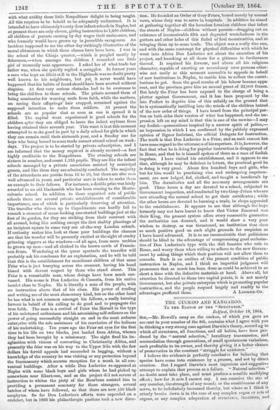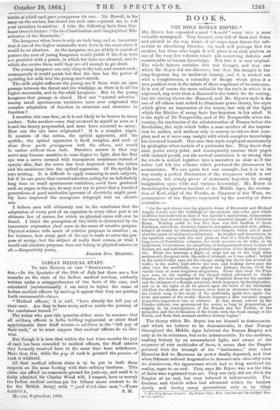THE CUCKOO AND KANGAROO.
To THE EDITOR OF THE " SPECTA.TOR."
Belfast, October 18, 1864. SIR,-Mr. Rowell's essay on the cuckoo, of which you gave an account in your number of the 8th, contains what I agree with you in thinking a very strong case against Darwin's theory, according to which all structures, all functions, and all habits, have been pro- duced by the "natural selection," hereditary transmission, and accumulation through generations, of small spontaneous variations, each profitable to its owner, and thereby giving it a better chance of preservation in the constant "struggle for existence."
I believe the evidence js perfectly conclusive for believing that species have come into existence by a process, and not by direct creation. But I regard Darwin's most ingenious and suggestive attempt to explain that process as a failure. "Natural selection" no doubt must take place, and must produce a sensible modifying effect; how far it acts I cannot say. I can conceive the siz3 of any member, the strength of any mesa:. or the sensitiveness of any nerve, to be indefinitely increased thereby, but where as I think it utterly breaks down is in the case of any complex organ or sets of organs, or any complex adaptation of structurts, functions, and habits of whirls earls part presupposes the rest. Mr. Rowell, in his essay on the cuckoo, has stated one such case,—permit me to call your attention to another. I take the following facts from Pro- fessor Owen's lecture "On the Classification and Geographical Dis- tribution of the Mammalia."
The kangaroo when born is only an inch long, and so immature that if one of the higher mammalia were born in the same state it would be an abortion. As the kangaroo ranges widely in search of pasture the race of young kangaroos would perish if the d an were not provided with a pouch, in which her teats are situated, and in which she carries them until they are old enough to go about.
The young kangaroo can only cling to the teat, and cannot suck ; consequently it would perish but that the dam has the power of squirting her milk into the young one's mouth.
The milk might suffocate the young one if there were an open passage between the throat and the windpipe, as there is in all the higher mammalia, and in the adult kangaroo. But in the young hangaroo that passage is closed. How can "natural selection' among small spontaneous variations have ever originated this complex adaptation of function to structure and structure to function? I mention this case first, as it is not likely to be known to many readers. Take another—one that occurred to myself as soon as I heard the theory propounded, and must have occurred to many. How can the eye have originated ? It is a complex organ. It consists of the retina, the optical apparatus, and the eyelids ; the optical apparatus is itself complex, and each of these three parts presupposes both the others, and would be useless without them both. Darwin's answer is that any nerve may become sensitive in some degree to light, that the first eye was a nerve covered with transparent membrane instead of opaque skin, that the nerve has been improved into the retina and the membrane into the optical apparatus. Of the eyelids he says nothing. It is difficult to apply reasoning to such subjects, but if he can prove that natural selection, acting for an indefinitely long time on small spontaneous variations, could have produced such an organ as the eye, he may next try to prove that a hundred generations of good mechanics ignorant of electricity might possi- bly have improved the semaphore telegraph into an electric one.
I believe men will ultimately rest in. the conclusion that the adaptation of every part of an organism to every other part is an ultimate law of nature, for which no physical cause will ever be found. I think the perception of this truth is obstructed by the inaccurate expression final cause in the sense of creative purpose. Physical science tells much of relative purposes in creation ; as, for instance, how every part of the eye is made to serve the pur- pose of seeing; but the subject of really final causes, or what I would call absolute purposes, does not belong to physical science at all.—Respectfully yours,
JosEnt Jo. MURPHY.



































 Previous page
Previous page